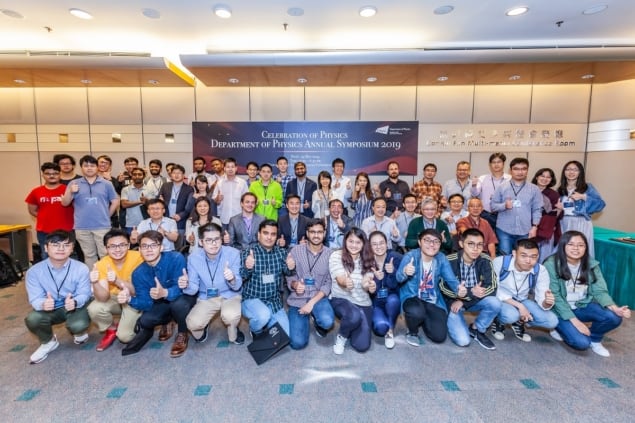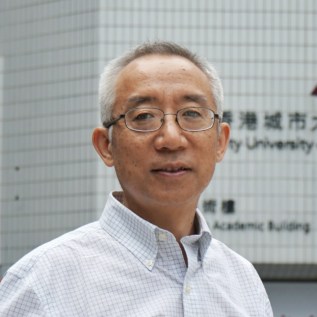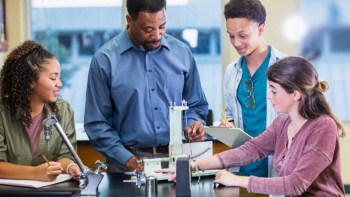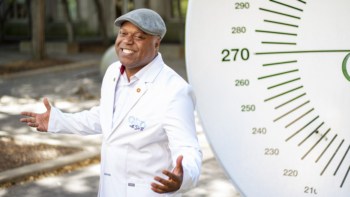City University of Hong Kong has ambitious plans to deliver global recognition and impact from its fast-growing physics research programme

City University of Hong Kong’s Department of Physics may be a relative newcomer, but faculty and students are taking advantage of its location – Hong Kong has long billed itself as “Asia’s world city” – and their own global connections to build a regional powerhouse for research and education.
“This is still a new department and we’re undergoing major expansion,” explains Xun-Li Wang, head of department and chair professor of physics at CityU. “Incoming faculty have a pivotal role to play in shaping the future of the physics programme. Generous funding – at national, university and department level – enables staff to quickly establish new research groups and to prioritize international collaborations.”
New is the key word here. The CityU Department of Physics was only formed in 2017, after the university chose to create distinct disciplinary specialisms from the former combined physics and materials science programme. For Wang, the opportunity is compelling: “We aim to create one of the leading centres of excellence for physics in the Asia-Pacific region – and in double-quick time.”

With this in mind, and perhaps even more so given the current political unrest in the Territory, a proactive and global recruitment strategy is hard-wired into the physics department’s DNA. In terms of department size, Wang expects to have around 30 faculty members on board by 2027 (versus an initial staff cohort of 12 when the department launched).
Postgraduate numbers, currently at 63, will also scale rapidly over the same timeframe to around 150 PhD students, while the number of postdoctoral researchers and research assistants (currently 30) is forecast to triple by 2027. In addition, the department has just launched a taught Masters degree programme, with an expected intake of 40 students.
It’s all about connection
Among the recent arrivals at CityU is Wei Bao, who joined last year as chair professor of physics specializing in experimental studies of quantum magnetism and unconventional superconductivity using elastic and inelastic neutron scattering. He is currently recruiting for PhD students and postdocs as he builds a new research team to investigate a range of correlated electronic phenomena in condensed matter, often under extreme conditions (low temperature, high pressure or high magnetic field).

Prior to CityU, Bao spent the previous decade working at Renmin University in Beijing, where he built up an extensive network of friends and collaborators. “Relocating to CityU allows me to maintain strong connections with my colleagues in mainland China,” he explains, “though I also have plenty of established collaborations with scientists at other Hong Kong universities. Equally important to me is that I feel a lot more connected here to my international colleagues.”
Bao’s international connections have their origins in the US, where he spent the formative years of his research career. After a stint as a visiting student at AT&T Bell Laboratories, Bao completed his PhD at the Johns Hopkins University in Baltimore, followed by postdoctoral work at Brookhaven National Laboratory and a technical staff position at Los Alamos National Laboratory.
Subsequently, that international mindset has underpinned much of Bao’s research, which relies on access to leading-edge neutron facilities – for example, the Spallation Neutron Source (at Oak Ridge National Laboratory in the US), the Institut Laue Langevin (Grenoble, France) and J-PARC (Tokai, Japan), among others. “One of the first things I say to early-career scientists is: ‘Join me and see the world!’”, he explains.
Closer to home, Bao sees significant opportunities taking shape around the China Spallation Neutron Source (CSNS), a big-science facility that’s under development in Dongguan City, just across the border from Hong Kong in mainland China. The Joint Laboratory on Neutron Scattering (Joint Lab), a collaboration between CityU and the Institute of High Energy Physics of the Chinese Academy of Sciences, aims to take advantage of CityU’s proximity to strengthen cooperation with CSNS scientists and engineers on specialist training, research and equipment R&D.
“We have a mechanism through the Joint Lab to closely engage with the planning and exploitation of the CSNS,” explains Bao. “Our vision is to become the Hong Kong champion for neutron scattering and an international gateway into this state-of-the-art facility and others like it in mainland China.”
Beyond his own research interests, Bao reckons the quality of CityU’s physics faculty (currently 20 permanent staff) is one of the department’s biggest selling points to early-career researchers. “This is a new department, but if you look at our collective resumé it’s clear that we are recruiting high-calibre staff with a real depth of experience.”
Four of those faculty, for example, are Fellows of the American Physical Society. There’s also top-down encouragement for younger faculty to pursue curiosity-driven research. “We want our physicists to fully embrace the intellectual freedom of Hong Kong and scout for possibility wherever their line of enquiry takes them,” Bao explains.
He continues: “All of our faculty at CityU are well connected internationally. That’s a big plus for PhD students seeking attractive postdoc positions and ultimately intending to pursue a long-term career in academic research.”
Location, location, location
CityU’s role as a regional hub for globally minded physicists is a recurring theme in conversations with the university’s senior physicists. Take Condon Lau, an assistant professor at CityU who specializes in fundamental biophysical and biochemical studies using techniques such as laser spectroscopy and magnetic resonance imaging.

“I joined CityU five years ago because of its aggressive plans for expansion,” he explains. “There are openings in lots of different research areas, which makes it an attractive destination for developing your career.”
Lau himself is a study in the globe-trotting research scientist. Before joining CityU, he spent several years as a postdoctoral fellow at the University of Hong Kong, the Territory’s oldest academic institution. That followed an extended early-career spell in the US and an undergraduate degree at Princeton and PhD at MIT.
He now heads up his own 10-strong research team, including five PhD students for whom he is primary supervisor and another three that he co-supervises. For Lau, the big selling point of CityU is Hong Kong itself. “The Territory is a multicultural and multinational melting pot,” he explains. “The whole economic model here is based on an outward-facing mindset to engage with mainland China and the rest of the world.”
That macro, state-level approach is replicated at undergraduate and postgraduate level with the help of generous travel bursaries that enable students to attend overseas conferences and secure research internships at leading international institutions.
It’s a win-win, says Lau. “It’s good for the students in terms of their domain knowledge, breadth of experience and contacts. It’s good for the research groups here at CityU as well. I have a lot of international collaborators as a direct result of this exchange activity and co-author papers with groups in Mexico, China and the US. There’s a ‘trickle-up’ effect for sure.”
Funding is also geared towards attracting the best overseas talent to Hong Kong. The Hong Kong PhD Fellowship Scheme, for example, is a selective programme (there are around 250 recipients each year) that provides postgraduates with an annual salary of around US$40,000. That salary is topped up with US$1700 a year for work-related travel, with supplements from CityU. A similar programme is now also in place to attract postdoctoral scientists to Hong Kong.
One other big draw, especially for entrepreneurially inclined physicists, is the Greater Bay Area initiative. This ambitious regional investment programme aims to transform the Pearl River Delta (encompassing Hong Kong, Macau, Shenzhen and nearby cities in Guangdong) into a technology and innovation powerhouse that, its backers hope, will ultimately rival Silicon Valley in California.
“There’s a lot of tech investment and a real start-up culture in this part of the world,” says Lau. “That culture extends to CityU, where the university is very supportive of students and faculty seeking to patent and commercialize their breakthroughs.”
Call for applications
CityU Department of Physics is currently seeking applications from outstanding scholars for several open faculty positions. Core areas of interest include (but are not limited to): theoretical and computational physics; spectroscopy and imaging; low-dimensional systems and quantum materials; soft matter and biophysics; and atomic, molecular and optical physics.
The department also invites applications and expressions of interest for its PhD programme. Candidates able to demonstrate outstanding performance versus research capability, communication and interpersonal skills, and leadership potential are encouraged to apply through the Hong Kong PhD Fellowship Scheme.



